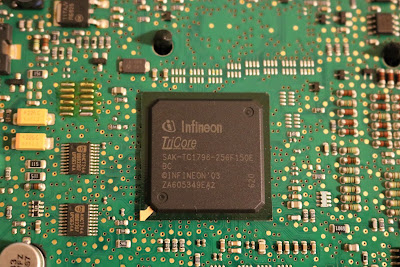Central ProcessingUnit (CPU)
CPU, a chip that
basically makes our computer system work appropriately, needs to be hasty and prompt.
Life is getting more brisk and busy as time is moving ahead. To meet the requirements
of this instant and speedy world, energetic and abrupt responses are required. As
today's world has got obsessed with the usage of technological innovations and
computers, thus we need fastest processors for the acquisition of rapid
consequences.
5 factors affecting the processing speed of a computer
People frequently ask questions: "Why is my computer so slow all of a sudden?" or: "how to speed up my slow computer?".The fast and efficient working of our computer systems is entirely dependent upon the processing speed of our processors. However, some factors
make it difficult for the processor to work speedily. Here are the 5 main factors affecting the processing
speed of a computer. These factors are the main reasons "why your computer slows down" . Hence, the following basic factors are the solution of your all problems and the answer to your worrying question that how to make your computer faster?
- RAM
RAM, the temporary storage area is one of the major factors affecting the processing speed of
a computer. CPU reads the
data from the main memory. We can say that the data; processor needs to process on; is collected from RAM. That's why the processing speed is
directly related to the RAM size. You can have a clear understanding of this process when you learn how CPU and RAM interacts with each other.
The higher the capacity of RAM, the larger amount of data can be stored in it and hence the processor can access the data straight away. In case, the computer does not have enough memory to store the instructions that are to be processed by CPU, some of the data is needed to locate in hard disk. When this data needs to be processed by CPU, it is moved to RAM and this process of moving the data between RAM and hard disk is called “Swapping”. Swapping is the process that is responsible for slowing down our computer systems.
The higher the capacity of RAM, the larger amount of data can be stored in it and hence the processor can access the data straight away. In case, the computer does not have enough memory to store the instructions that are to be processed by CPU, some of the data is needed to locate in hard disk. When this data needs to be processed by CPU, it is moved to RAM and this process of moving the data between RAM and hard disk is called “Swapping”. Swapping is the process that is responsible for slowing down our computer systems.
- Buses
Let’s talk about another factor
substantially involved in affecting the processing
speed of our computers. Buses, the paths between different computer
components, are highly considered when it comes to the processing speed of
computer system. The larger the bus
width, the higher would be the speed
of processor as these communication lines are responsible for carrying the
data between the CPU and RAM. Data called for processing is
to be traveled from memory through these bus lines. Hence wider bus would carry
more data which means that the processor
does not need to wait for the data as it gets the data right away which is incredibly
agreeable for increasing the processing
speed of our systems.
- Registers
While processing, CPU stores the data and instructions in registers.
Register is a small high speed memory
inside the Central Processing Unit that intends to store
data and instructions being processed. However, the data is stored temporarily
i.e. till the processing is in progress. CPU
contains numerous registers and each register aims to perform a predefined
function i.e. every register inside the Central Processing Unit
is restricted to carry out a specific task. The size of register determines how
much data can be stored in it while processing. Thus the size of register is also one of major factors affecting the processing speed of a computer.
- System clock
Here is another crucial factor affecting the processing speed of a computer
enormously. System clock is an electronic component that generates
the electric signals and conducts all the operations of computer using clock ticks. These ticks of the
system clock are known as clock cycle. The higher the speed of the
clock, the larger amount of data and instructions can be processed by the CPU. The speed at which the processor
executes the instructions is called clock speed or clock cycle.
- Cache memory
One of the factors affecting the processing speed of a computer immensely is cache memory. This type of memory located on the CPU; stores only
the data and instructions that are used and processed by the CPU
every now and then. CPU, when requires any data or instructions to get
processed, it first moves towards cache memory and determines if the required
data is present in the cache memory.
It then gets the data from there otherwise moves towards RAM. The cache memory size
has a huge impact on the processing speed
of computer. The cache memory
with huge storage capacity can massively stock the data and instructions that
are most frequently processed by the CPU.
Processors can execute the instructions more efficiently by attaining them from
cache memory instead of RAM.





No comments:
Post a Comment